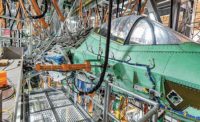INGOLSTADT, Germany—Audi AG is using Edge Cloud 4 Production (EC4P), a new method of IT-based factory automation, at its assembly plant in Böllinger Höfe that specializes in low-volume sports car production.
A local server cluster controls the worker support systems for two production cycles of the e-tron GT quattro, RS e-tron GT and Audi R8 models. In the future, the software-controlled, flexible and scalable server system will replace a decentralized control system that relies on high-maintenance industrial PCs.
EC4P enables Audi engineers to redeploy the computing power the assembly line requires to local data processing centers. In addition, they are adapting EC4P for other uses in the Audi Production Lab (P-Lab).
EC4P uses local servers that act as data processing centers. They can process extensive
production-related data with low latency and distribute it to systems that tell assemblers which vehicle part to install.
“Our motto is software, not hardware,” says Sven Müller, head of the EC4P project. “EC4P enables the quick integration of software and new tools, whether for worker support, bolt control, vehicle diagnostics, predictive maintenance or energy savings.”
“We want to bring local cloud solutions to production at our plants to take advantage of advances in digital control systems,” adds Jörg Spindler, head of production planning and
production technology at Audi. “It makes it possible to level out spikes in demand across all virtualized clients, speeding application deployment and ensuring more efficient use of resources.”
The flexible cloud technology also scales to adapt to future tasks. The architecture of the server clusters is designed to enable rapid scaling of EC4P in large-scale production.
“With EC4P, we are merging the fields of automation technology and IT to advance our practical use of the Internet of Things,” says Müller. “This development will also create new employee roles at the interface of production and IT.
“For example, employees will use new applications to control automation technology,” explains Müller. “We are setting up a control team with overarching expertise to supervise and monitor the EC4P system around the clock.”
“We work as a team to free up resources for new areas like battery and module production,” adds Spindler. “New technologies and collaboration models will require our teams to acquire new skills. For that reason, our employees’ qualifications play an important role.
“With its longer cycle times, we view the Böllinger Höfe plant as a learning environment to roll out IT-based factory automation later at larger sites, such as Ingolstadt and Neckarsulm.”



